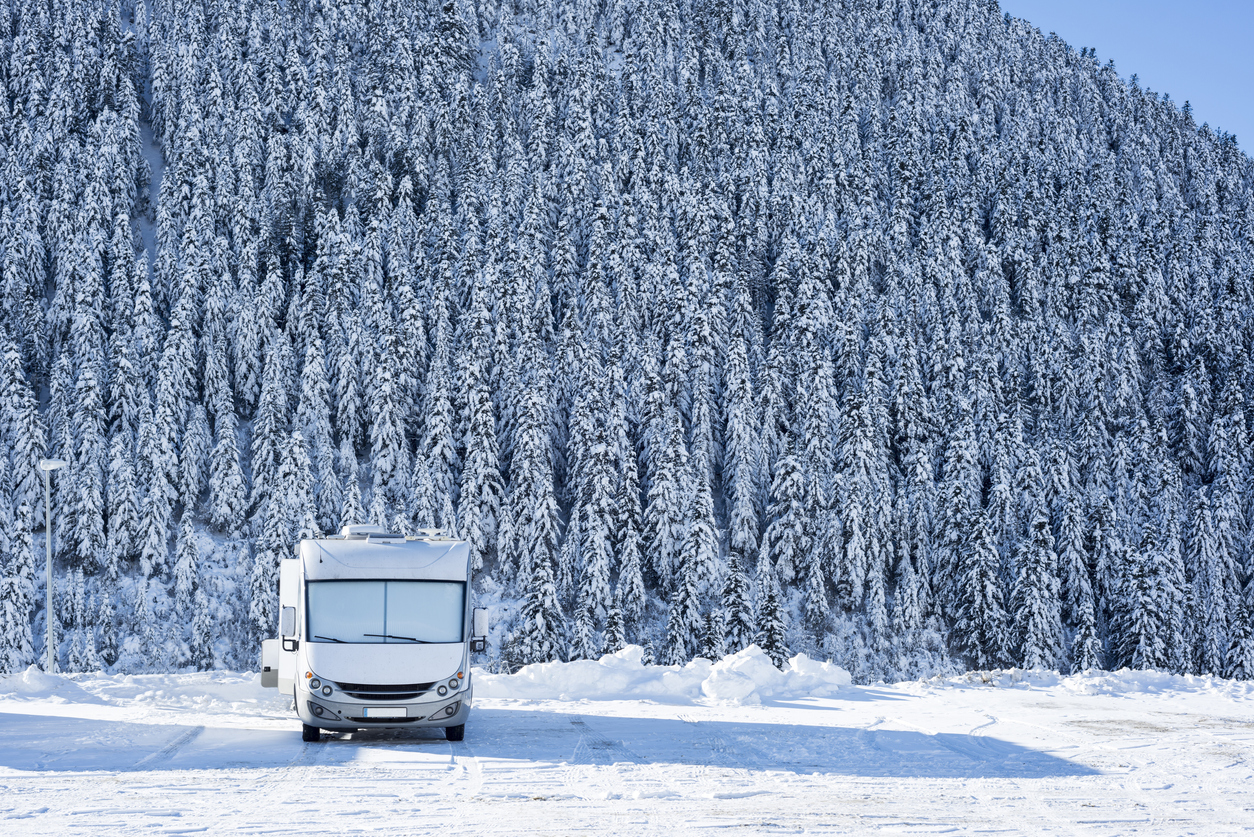
If you’re planning to take your RV out this winter, you may be having some concerns, even if you are an RV pro. Winter driving elements add a whole new level of danger for just about any vehicle, so it is especially important to follow these best practices and be properly prepared with an RV.
RVs Handles Differently Than a Car
Most motorhomes use rear-wheel drive rather than front-wheel drive, which is common in most smaller passenger vehicles. Therefore, most of the strategies one would use to manage a slippery situation in a car would not work the same way in an RV. The majority of an RV weight is in the front wheels, and with a rear-wheel-drive vehicle, there is much less control and traction. With any extra weight behind the vehicle, braking too late or too hard will cause that weight to push your vehicle around, and a towed trailer can easily skid. It is best to go slow, brake easily, and keep plenty of space between you and the car ahead of you. Also, double-check the manual of any automatic brakes or brake controllers you may be equipped with to ensure they’re suitable for snowy conditions.
Tire Check
Even if you normally don’t use snow tires on your daily drive, it is vital to upgrade your RV. Most rigs come with highway tread or summer tires, which are quiet but do not have the gripping power needed to stay safe during winter road conditions. You might also want to consider purchasing a set of tire chains in case conditions become extreme. Tire chains may even be mandatory, especially for trailers, so check the rules in your area before you hit the road.
Use your Low Beams
Bright lights are extremely reflective of snow, which will disrupt your vision. Use your low-beams to avoid this hazard, and if possible, avoid night driving altogether. Driving in the snow is dangerous enough — do what you can to not add darkness to the mix.
RV’s Pipes Can Freeze
Be proactive in winterizing your RV, or you could face a costly repair bill — and a huge inconvenience – if your rig’s pipes freeze halfway through a trip. Although some RVs are equipped with heated water duct systems, many are not. If you are unsure if yours is equipped with this feature, you can check with your local motorhome specialist to determine whether you have or if it can be installed. Some people wrap their pies in heat tape, and others use RV-specific antifreeze for potable water systems. Keep in mind that you can not use regular automotive antifreeze in your RV.
Check Your Batteries
Since cold weather decreases battery performance, you will want to avoid getting stalled or be without access to heat. Before your trip, it is essential to check that all your batteries (including auxiliaries) are well-charged and in good working condition. It is also a good idea to check that you have plenty of propane if you need to run your generator for heat.
Gear Up
Be sure to pack enough water, extra food, and plenty of clothing and blankets. It is always better to be safe than sorry if you should find yourself stuck in a sticky situation. People often forget to bring one, but a windshield ice scraper comes in handy during winter travel.
It’s ok to Change Plans
It’s simple, if you’re feeling unsure or unsafe at any time, pull over. Straying from your RV travel plans may be a bummer, but it is well worth it to avoid danger, such as sliding off the road into an icy ditch, or worse. You can always make the most of the situation and maybe fill up on gas or explore a town that wasn’t originally on your plans. When the weather clears up, you can continue on your original route.
About Transparity Insurance Services
Transparity Insurance Services was founded for the purpose of helping clients to ensure their property and assets with no hassle. We are committed to providing a simple, easy, efficient, and positive experience to all of our clients, and prioritize open and transparent communication with our clients. Through our excellent customer service and technology, we can help you to find the right insurance program at a competitive price. Contact us today at (855) 889-2037 to learn more about what we can do for you.

 Leave a review on google
Leave a review on google